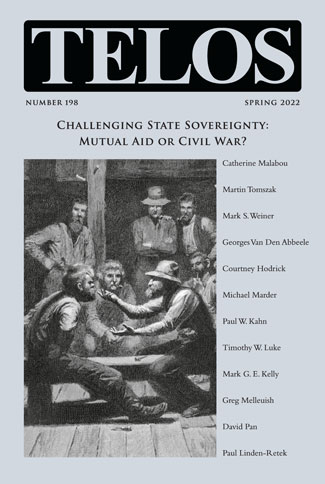In today’s episode of the Telos Press Podcast, David Pan talks with Courtney Hodrick about her article “From Neoreaction to Alt-Right: A Schmittian Perspective,” from Telos 198 (Spring 2022). An excerpt of the article appears here. In their conversation they discuss Carl Schmitt’s understanding of the relationship between liberalism and democracy, and how the separation of the two from each other leads to two versions of extreme right thinking; the general outlines of Mencius Moldbug’s rejection of politics in favor of markets and the relationship between this approach and Schmitt’s understanding of politics as based in the friend/enemy distinction; why Moldbug is an example of what Schmitt defines as liberal; how Moldbug’s ideas contrast with those of Richard Spencer and the extent to which Spencer is a Schmittian; and Curtis Yarvin’s recent shift away from his previous rejections of nationalism and whether this shift represents a merging of neoreaction with alt-right populism. If your university has an online subscription to Telos, you can read the full article at the Telos Online website. For non-subscribers, learn how your university can begin a subscription to Telos at our library recommendation page. Print copies of Telos 198 are available for purchase in our online store.
|
In today’s episode of the Telos Press Podcast, David Pan talks with Georges Van Den Abbeele about his article “Can the Precariat Be Organized?: The Gig Economy, Worksite Dispersion, and the Challenge of Mutual Aid,” from Telos 198 (Spring 2022). An excerpt of the article appears here. In their conversation they discuss the history of the welfare state in the context of mutual aid, the idea of the “precariat” and how it relates to the idea of the working class and the question of mutual aid, and the new forms of mutual aid that are now possible with the rise of both the gig economy and new forms of social interaction. If your university has an online subscription to Telos, you can read the full article at the Telos Online website. For non-subscribers, learn how your university can begin a subscription to Telos at our library recommendation page. Print copies of Telos 198 are available for purchase in our online store. In today’s episode of the Telos Press Podcast, David Pan talks with Martin Tomszak about his article “‘With Desire I Have Desired’: Enjoying the Face of the Other as Political Theology: John Caputo and Dorothy Day Situating Hospitality as Divine Encounter,” from Telos 198 (Spring 2022). An excerpt of the article appears here. In their conversation they discuss the basic tenets of the theology of divine weakness, as developed by John Caputo; how this theology arises out of Caputo’s reading of Derrida and his rereading of scripture, specially Luke’s description of the life of Jesus of Nazareth; how Dorothy Day and the Catholic Worker movement translated this theology of divine weakness into practice; how this theology relates to the writings and praxis of Peter Maurin; and how Day and Maurin understood the idea of state sovereignty and why they were opposed to state-sponsored forms of welfare. If your university has an online subscription to Telos, you can read the full article at the Telos Online website. For non-subscribers, learn how your university can begin a subscription to Telos at our library recommendation page. Print copies of Telos 198 are available for purchase in our online store. Telos 198 (Spring 2022): Challenging State Sovereignty: Mutual Aid or Civil War? is now available for purchase in our store. Individual subscriptions to Telos are also available in both print and online formats.
In spite of this fragmentation, though, there are two main concerns that are shared. In the first place, there seems to be a general recognition among these different perspectives that the inhabitants of a state are not completely homogeneous and that the internal heterogeneity of a state should be at least in part the basis for domestic order. If libertarians prefer market-based structures and traditional conservatives look to family and religion, liberals seem to have gravitated toward identity-based groupings, and anarchists might prefer mutual aid organizations as independent places of sovereignty within which individuals can define themselves. The disagreements concern the type of heterogeneity that is being called for as well as the precise mechanisms for supporting diverse organizations within the state. |
||||
|
Telos Press Publishing · PO Box 811 · Candor, NY 13743 · Phone: 212-228-6479 Privacy Policy · Data Protection Copyright © 2025 Telos Press Publishing · All Rights Reserved |
||||



